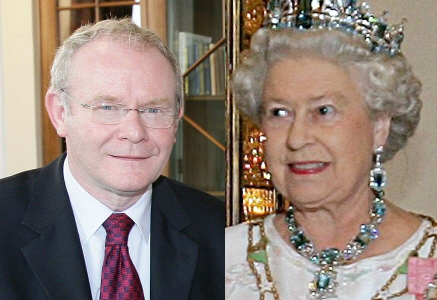In Northern Ireland today history will be made when The Queen shakes hands with former IRA Commander Martin McGuinness. When he was busy trying to gain support for a united Ireland, The Queen was grieving the death of her husband’s uncle, Lord Mountbatten. The Roman Catholic and former republican terrorist will shake hands with the Head of the Church of England who is also the Head of the British Armed Forces who fought against Mr McGuinness. When he was engaged in commanding attacks on Protestants he probably could never have imagined such a day.

But if Mr McGuinness were to say that he had changed, that he had realised that peaceful ways were the way forward we would be less likely to believe him. After all he would say that wouldn’t he? The fact that for the past 15 years Mr McGuinness has been a peaceful politician working hard on a peace process that, for the most part, has endured is something we might forget when confronted with the fact that he was regarded by the British Government as a terrorist.
However, by shaking hands with the Deputy First Minister of Northern Ireland, The Queen is publicly saying that The State now accepts Mr McGuinness; she is doing his publicity for him. The mere fact that The Queen is shaking the hand of Mr McGuinness gives him additional credibility. No matter which side of the argument about Northern Ireland you may be on, this handshake changes thinking.
It is the “third party” nature of the credibility provided for Mr McGuinness which is so important. One of the principles of persuasion and influence is called “social proof”; when other people are seen to be doing something we are more likely to want to do it ourselves – especially (as in the case of The Queen) if they are an authority figure. Today’s handshake therefore makes it more likely people will be persuaded of the reform of Mr McGuinness.
The handshake also coincides with interesting research on the political progress of the candidates for election to the post of the President of the United States. Researchers have looked at the impact of advertising on how the public support for each candidate has changed. In particular, the study looked at the value of “attack” advertising, where one candidate was negative about the other. The researchers found that such advertising had considerably more impact when it was produced by independent groups, rather than by candidates themselves. In other words, candidates who said nasty things about the opposition had much less effect than independent organisations saying the same things.
It is another example of the “third party” effect. When you say your business is brilliant, people say “yeah, great, I knew you would say that”. But when someone else says your business is great the reaction is “really, that’s interesting, thanks for recommending them to me”.
Ultimately, it means you need to be like Martin McGuinness, riding on the coat tails of a third party doing your publicity for you. Not only do you gain credibility, you also get the “social proof” effect and you don’t suffer the “you would say that” reaction.
Related articles
- The Queen to meet Sinn Fein’s Martin McGuinness in historic meeting (itv.com)
- Queen and Martin McGuinness to shake hands – BBC News (bbc.co.uk)

